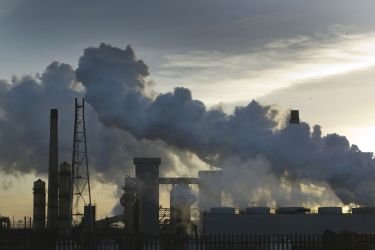The gas price crisis is a systemic problem, which needs systemic solutions
As gas prices soar this winter, millions of people are being forced to choose between eating and heating. By spring 6 million homes will be in fuel poverty, the highest number since records began – with many unable to access the energy they need to stay warm.
Low-income households in less efficient homes will be hardest hit by the soaring bills, paying £500-£1,000 more per home. This can mean intolerable living conditions, ill health and a shorter life.
Meanwhile, the UK’s manufacturing businesses are being pushed to the brink by high gas prices, threatening quality unionised jobs. This adds to the risk of 650,000 jobs in high carbon sectors being offshored by a lack of government climate action.
The UK is highly dependent on global gas markets, which impose volatile prices and transfer billions in profits to both oil & gas companies and authoritarian regimes, at the expense of low-paid households.
A systemic failure
This is happening because UK’s energy supply system is bust.
The market has failed to deliver affordable or secure energy. A decade of calling for more competition and telling consumers to switch has failed. Now households are facing a cost-of-living crisis thanks to a regime that embedded moral hazard and risk-taking.
The UK’s energy infrastructure (including gas and energy storage, energy networks, nuclear energy, and domestic manufacturing for renewable energy) has been hollowed out by under-investment. Just four years ago, the UK’s biggest gas storage facility at Rough was closed, slashing our gas storage capacity threefold. The UK’s high dependence on globally traded gas for heat and power generation makes bills subject to the volatility of an unregulated commodity market.
Our energy system is set up to expose households and businesses to soaring gas prices.
Energy is a public good
Structural solutions exist – if we recognise that access to energy is an essential public good, and should be treated as such.
Public ownership is the clear alternative to the failure of the energy supply market. A consistent and large majority of the public, across the political spectrum, supports taking energy back into public hands. Public ownership can provide long-term price stability for households and accelerate the climate transition.
And ensuring warm homes for all requires an accelerated and expanded domestic retrofit and home insulation programme, with a commitment running until 2030. Learning from the success of the Local Authority Delivery scheme of the Green Homes Grants, this should be delivered in-house by local councils, using direct labour to build up skills and capacity.
Help people pay the bills
A pay-rise – especially for those on low incomes – would also reduce the devastating impact of the cost-of-living crisis. Fuel poverty is ultimately only another name for poverty. A decade long pay squeeze coupled with consistent attacks on our social security system – from slashing the social fund that helped families with one off costs, to the cut to Universal Credit just as we entered the crisis, have hit families’ ability to weather price changes.
We also must take immediate-term action to protect the most vulnerable and lowest paid.
This should include protections targeting low-income households, for example through increases in the Warm Homes Discount, and making it available to all households on Universal Credit or Pension Credit. Universal Credit should be increased to 80 per cent of the real living wage, around £260 a week – on a permanent, not temporary basis. And the environmental levy should be moved off electricity bills, and onto general taxation, to end its current regressive impact.
To manage the social crisis caused by soaring gas prices, support should be commensurate in scale to the increases in energy bills. Saving households £60 will do little when their bills go up by £600.
And revenues should be clawed back from companies profiteering from high gas prices, not paid out in bonus dividends or share buybacks. The TUC supports calls for a windfall tax on North Sea oil & gas companies, and proposals have been made by Labour and the Liberal Democrats.
Rising gas prices don’t need to trigger a crisis. But the failure to invest in infrastructure to wean ourselves off global gas markets, and the attacks on workers pay and social security, have decimated our ability to cope. We need urgent action now to get us through the winter. But most of all we need a coherent energy policy with investment in the infrastructure we need to reach Net Zero, that delivers energy to people and workplaces as a public good.
Stay Updated
Want to hear about our latest news and blogs?
Sign up now to get it straight to your inbox


